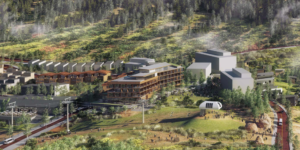
Eden, Utah’s Summit Village — a community development intended to attract celebrities, influencers, and business leaders to the Utah resort town — hit a difficult patch this summer as its lending group sent a notice of default claiming over $51 million in debts.
Summit Village is a planned four-acre development in Eden, which is planned to include commercial, restaurant, and retail space, alongside housing, hotels, and event spaces — some of which will be added in areas surrounding the main village.
Hong Kong-based lending group Celona Asset Management claimed at the time of its default notice that Summit Holdings owed $51.3 million on its original $120 million loan — requesting an additional $360,000 in interest. In the default notice, Celona added that Summit Holdings had completed a significant amount of construction on the project.
In return, Summit Village holding group Summit Holding filed a lawsuit on August 4, 2021, that accused Celona Asset Management of breaching its contract by failing to deliver the loan proceeds on time.
Summit Holdings claimed that Celona had delivered only $42 million of the $120 million in funding in 2019, and that it had already provided $35.9 million in equity requirements by that point — more than meeting its requirements within the loan agreement.
As per court documents, Summit Holdings additionally accused the lenders of using the remaining $78 million raised for the loan on other projects, and mishandling numerous opportunities that would have provided the project with what the company claims would have been $50 million in additional funding.
Beyond this, Summit Holdings noted that the loan default would unnecessarily block the company’s goal to gain another $150 million in funding.
Securing funding responsibly has been an issue for Summit Holdings
These actions follow an April 26, 2021, complaint filed against the company that alleged two counts of breaches of contract by Summit Holdings. As part of the legal action, former investor Lionel Ohayon requested $1 million in repayment from the company.
According to the lawsuit, Ohayon was engaged as a founding member of an investment group for what was known as the “Powder Mountain Project,” and invested $500,000 in the project in 2013.
However, as court documents note, the project “never materialised in any meaningful way” — leaving Ohayon’s money spent but with no investment returned. Requests made by Ohayon in 2019, 2020, and earlier in 2021 for the return of his investment were not responded to, leading to the filing of the lawsuit for the original investment and further damages — which resulted in an eventual $1.3 million payment to Ohayon.
Though focus has shifted, significant development is still likely to occur at Summit Village
Summit Holding purchased the area in 2013 in order to hold invitation-only events called the “Summit Series,” which focused on bringing high-profile guests into a mountain recreation atmosphere. Following this, the group planned a series of developments in Eden centered around Summit Village.
As it has come together, the development has become a darling of the elite: Summit claimed in court documents that buyers of its single-family sites in the complex had so far included notables such as Netflix co-founder Reed Hastings, former UNICEF Secretary General Ann Veneman, and Virgin Group founder Sir Richard Branson.
“[These people] own lots and we have at least three very prominent people in completed homes,” added Summit Village general manager Mark Schroetel.
Despite the project’s difficulties, Schroetel maintained that the development of the community — estimated to cost over $207 million in total — wouldn’t be held back by the legal problems.
“The status of the project is progressing,” said Schroetel. “We are looking for additional funding and we are in the process of receiving term sheets. We do not see [the[ loan dispute]] as an obstacle to the progress of the project.”
At the time of Summit Holdings’ lawsuit against Celona, the project was in multiple different states of completion. According to Schroetel, while the infrastructure for the village was under construction, no other work was being done on the main village area. However, a housing district outside the main village was “advancing to various stages of completion.”
Schroetel added that the varying states of construction were somewhat due to the changing market and climate around the COVID-19 pandemic, and that while “the overall main concept is still intact,” the project could see shifts as a result.
“Based on the interest we’re getting and the term sheets we have out there to complete that, that’s not an issue,” Schroetel added. “The bigger question is: What are we going to build?”